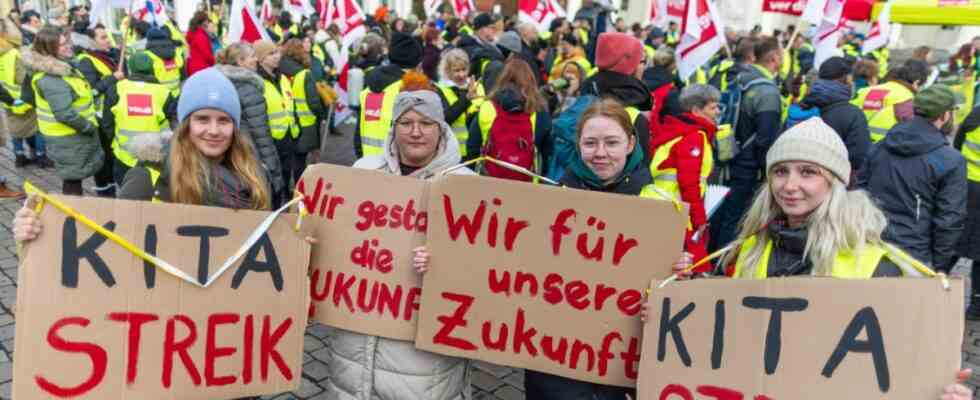Verdi extends the warning strikes in the public sector. The second round of negotiations for the 2.5 million public sector employees ended on Thursday evening without an agreement. The employer’s offer was “disrespectful,” said Verdi boss Frank Werneke, and the employees met with “disappointment and rejection.” The employers have proposed a permanent wage increase of five percent in two steps, the new collective agreement should run for 27 months. In addition, there should be an inflation compensation premium of 2500 euros.
The employers announced that the offer totaled twelve percent more money for the employees, including the inflation premium and other special payments. They called on the trade unionists to come to an agreement quickly – but they are still going on warning strikes. It is certain that the labor dispute will affect hospitals and daycare centers, among other things.
The escalation had already become apparent in the past few weeks. The unions were combative and had already called on individual administrations, day-care centers and hospitals for shorter warning strikes, and last Friday there was a 24-hour strike at almost all airports in Germany. Werneke announced that it would depend on the employers whether there would be even larger strikes. In order to prevent them, the federal government and local authorities would have to “submit a wage offer that has a chance of reaching an agreement” no later than the second round of negotiations, which took place this Wednesday and Thursday.
Employers “cannot understand” early strike calls
Employers, on the other hand, had always emphasized that they did not want to let themselves be carried away. “We have agreed that we want to reach a result in three rounds of negotiations,” said the chief negotiator for the municipalities, Karin Welge (SPD), whose main job is mayor of Gelsenkirchen. She “cannot understand at all” the early calls for a strike.
A constructive atmosphere prevailed in the talks, according to negotiating circles, but the two sides are still far apart. Verdi and the other trade unions involved – the civil servants’ association, IG Bau, the GEW training union and the police union – are demanding 10.5 percent more wages for a contract term of twelve months.
For many of the 2.5 million employees, however, the wage demand is significantly higher, which is due to the minimum monthly amount that Verdi insists on: in future, every public employee should earn an additional 500 euros gross. In fact, for many, that would mean a pay rise of 15 to 20 percent.
On the one hand, the trade unionists justify this with inflation, which was 7.9 percent last year and is forecast to remain high in 2023. In addition, wages in the public sector have risen more slowly than in the economy in recent years. They also point to the many vacancies – around 300,000 according to union information – and demand that public service urgently needs to become more attractive.
Municipalities argue with high levels of debt
The municipalities argue that they can hardly pay for the high wage increases, many are heavily indebted. Verdi had to move away from the 500-euro demand, said negotiator Welge – not just because that was too much money. “Such a minimum amount is the completely wrong signal at a time when the motivation to become a manager or bearer of responsibility has waned.” During the negotiations on Wednesday and Thursday, Welge was represented because she was suffering from Corona.
Hopes that a quick agreement might be reached despite the opposing positions rested primarily with Interior Minister Nancy Faeser. On the one hand, the SPD politician represents the employer side of the federal government in the negotiations, on the other hand, she is interested in a good wage agreement for the employees – also because she wants to win the state elections in Hesse in autumn.
She was “confident that we will eventually come to a fair agreement with the unions at the negotiating table,” Faeser said before the round. But this agreement will be a few weeks away, that much is now clear. The next negotiation meeting is scheduled for March 27-29.

